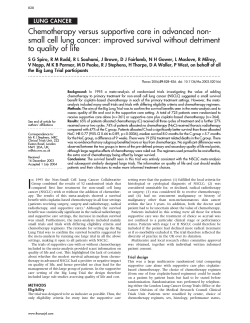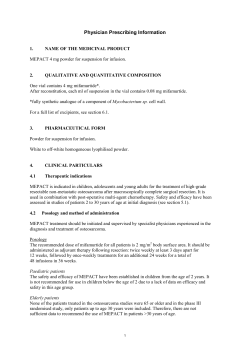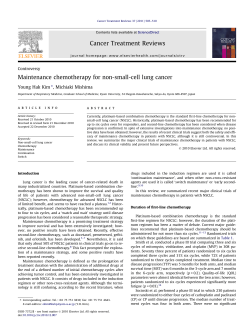
Duke University Hospital Approved by: Senior Management DRUG DISTRIBUTION Group
Duke University Hospital Approved by: Senior Management Group Department of Pharmacy Effective Date: 7/12 DRUG DISTRIBUTION Safe Prescribing and Dispensing of Chemotherapy in Adults Expiration Date: 7/15 POLICIES & PROCEDURES Archived Date: Page 1 of 12 SAFE PRESCRIBING AND DISPENSING OF CHEMOTHERAPY IN ADULTS I. POLICY A. In accordance with Pharmacy and Therapeutics Committee (P&T) recommendations, the goal of this policy is to promote the safe prescribing and dispensing of chemotherapy in adult patients, regardless of indication. This policy applies to medications administered at Duke University Medical Center (excludes retail pharmacies and medications intended for selfadministration at home). B. Definitions: C. 1. Cancer – malignancies that arise from the abnormal and uncontrolled division of cells that invade and destroy the surrounding tissues. 2. Chemotherapy – chemotherapeutic agent administered for the purpose of treating nonmalignant and malignant disease states. These include immunotherapeutic agents (i.e. rituximab, alemtuzumab, aldesleukin) and targeted therapies (i.e. cetuximab, imatinib, erlotinib.) Hormonal agents (tamoxifen, bicalutamide, leuprolide, etc.) are excluded. (Link to chemotherapy list) 3. Cancer chemotherapy – chemotherapeutic agent administered by any route for the purpose of treating malignancy. 4. Electronic orders - orders generated by approved physician order entry computer systems which include order verification via electronic signature of an approved prescriber. 5. CPOE – Computerized Physician Order Entry – Electronic order entry systems. a) Aria (Oncology CPOE system) - All forms of chemotherapy must be ordered utilizing this CPOE system in the outpatient setting. b) Horizon Expert Orders (DUH Inpatient CPOE System) – Only chemotherapy for non-oncology indications may be ordered utilizing this CPOE system. Authorized prescribers 1. All attending physicians in the Divisions of Medical Oncology, Hematology, Surgical Oncology, Gynecologic-Oncology, Neuro-Oncology and Cellular Therapy who are credentialed to prescribe cancer chemotherapy and who have completed the Duke Chemotherapy Competency Process. 2. All attending physicians in the Divisions of Cardiology, Dermatology, Gastroenterology, Medicine, Neurology, Nephrology, Obstetrics/Gynecology, Ophthalmology, Pulmonary and Critical Care, Psychiatry, Rheumatology, Urology http://Pharmacy.mc.duke.edu Duke University Hospital Approved by: Senior Management Group Department of Pharmacy Effective Date: 7/12 DRUG DISTRIBUTION Safe Prescribing and Dispensing of Chemotherapy in Adults Expiration Date: 7/15 POLICIES & PROCEDURES Archived Date: Page 2 of 12 who are credentialed to prescribe chemotherapy for non-oncologic indications and who have completed the Duke Chemotherapy Policy Competency Process. II. 3. The list of authorized prescribers is as available at (website/link) 4. Other providers with prescriptive authority, including fellows, PAs, NPs and CPPs, are not authorized to prescribe chemotherapy. They may write or enter chemotherapy after completing the Duke Chemotherapy Policy Competency Process but the orders must be signed by an authorized chemotherapy prescriber. The only exceptions to this are: a) New orders for oral chemotherapy for non-malignant conditions may be written by fellows or other MDs. b) Orders for continuation of chemotherapy for non-malignant indications, may be written by fellows or other MDs. PROCEDURES A. B. Consent/Education (Implementation Pending) 1. All patients receiving cancer chemotherapy, regardless of route, are consented and educated prior to initiation of any new therapy. This is documented in the medical record using a standardized consent form. 2. This consent/education can be obtained and documented by an Attending MD, fellow, PA, NP, CPP or nurses. 3. All patients who are prescribed cancer chemotherapy, regardless of route, are provided written educational materials before or at the time of prescription or administration. Chemotherapy Ordering 1. Types of Orders a) http://Pharmacy.mc.duke.edu Written/CPOE Orders (1) All orders for cancer chemotherapy, regardless of route, are written on a completed Chemotherapy Treatment Order Form (M-0804) or Pre-printed Chemotherapy Order Template (M30N21) or entered into an approved CPOE system and signed by an authorized chemotherapy prescriber. (2) Orders for all parenteral chemotherapy, when given for non-cancer indications, must also be written on a completed Chemotherapy Treatment Order Form (M-0804) or entered into an approved CPOE Duke University Hospital Approved by: Senior Management Group Department of Pharmacy Effective Date: 7/12 DRUG DISTRIBUTION Safe Prescribing and Dispensing of Chemotherapy in Adults Expiration Date: 7/15 POLICIES & PROCEDURES Archived Date: Page 3 of 12 system and signed by an authorized chemotherapy prescriber. 2. 3. 4. b) Orders for oral chemotherapy, when given for non-cancer indications, can be written on usual order form or entered into an approved CPOE system and signed by an authorized prescriber. c) Verbal Orders (1) Verbal orders for chemotherapy drugs and doses are not allowed. (2) Verbal orders may be accepted for the following, each of which must be documented. (a) Hold or stop chemotherapy (b) Date of administration changes (c) Diluent and administration rate changes (d) To clarify that “day one of chemotherapy will be given as written, subsequent days of treatment to be rewritten by physician” when variances of ≥ 10% are present but physician wishes to proceed. Time limitations of orders a) All orders for cancer chemotherapy, including oral agents, are written for one cycle at a time. b) For targeted agents only, once tolerance has been established, refills are acceptable. Names, Zeros, & Decimals a) Chemotherapy agents are prescribed using the generic name of the prescribed medication. No trade or chemical names are accepted. b) Abbreviations and acronyms are not accepted to avoid misinterpretation. c) No trailing zeros are allowed and leading zeros must be used for doses less than 1. d) Decimals are only allowed for chemotherapy doses less than 10mg or in clinical trials where rounding is not allowed. Decimals are only allowed to the nearest tenth. Regimens/Pre-printed orders a) http://Pharmacy.mc.duke.edu Dosing regimens in CPOE systems or typed order sets for paper orders will be utilized when ordering standard chemotherapy regimens and clinical trials. These require multidisciplinary review prior to use. Duke University Hospital Approved by: Senior Management Group Department of Pharmacy Effective Date: 7/12 DRUG DISTRIBUTION Safe Prescribing and Dispensing of Chemotherapy in Adults Expiration Date: 7/15 POLICIES & PROCEDURES Archived Date: (1) Page 4 of 12 CPOE regimen requests (a) Regimen requests are submitted via the CPOE regimen request form with supporting references. (b) Regimens will be formally reviewed by designated multidisciplinary group prior to activation. (c) Documentation of review process is maintained by CPOE superusers. (d) Regimens are reviewed and updated at least every 2 years. (2) Printed order sets (a) Regimens will be formally reviewed by designated multidisciplinary group prior to activation. Documentation of review process is maintained by designated oncology pharmacy staff. (b) Regimens are reviewed and updated at least every 2 years. b) Regimens not prescribed utilizing prebuilt CPOE regimens or reviewed order sets, will include a reference at the time of order submission. (1) Standard reference sources include NCCN practice guidelines, the Chemotherapy Sourcebook (Perry), and Chemoregimen.com. For orders based on research protocol schemas or roadmaps, prescribers will document the source in the orders and provide a copy of the treatment schema at the time of order submission (2) c) 5. Abstracts and case reports, will be considered for treatment on a caseby-case basis. If no supporting documentation is available or there is disagreement about provided documentation, utilize resolution process in section B.1.b (Questions/Issues with Orders) Required elements of an Order a) Patient’s full name and second patient identifier b) Date order written/dates of administration c) Diagnosis d) Regimen name and cycle number http://Pharmacy.mc.duke.edu Duke University Hospital Approved by: Senior Management Group Department of Pharmacy Effective Date: 7/12 DRUG DISTRIBUTION Safe Prescribing and Dispensing of Chemotherapy in Adults Expiration Date: 7/15 POLICIES & PROCEDURES Archived Date: Page 5 of 12 e) Protocol name and eIRB number (if applicable) f) Appropriate criteria to treat (ie. Lab parameters (ANC, platelets, etc.) , other treatment criteria, toxicities or other tests) (a) For new treatments, labs that are greater than 2 weeks old should be confirmed with Attending MD, NP, PA or CPPs. (b) For patients on treatment, labs, when required, should be within 24 hours of treatment. g) Allergies h) Dosing parameters required for calculation verification by other practitioners must be included in the order. This includes: (1) (2) (3) Height, weight, and body surface area (BSA) (a) For new treatments, weight must be within one week of day one of administration. (b) For subsequent cycles, weight must be within 24 hours of day one of administration (c) For doses based on weight alone, height & BSA are not required. (d) If using IBW or ABW, the order must include the formula used for verification. Serum Creatinine (SCr), creatinine clearance or GFR for AUC based therapies and formula used. For medications ordered by standard, flat, ‘non-parametric’ or ‘nonindividualized’ doses (examples: imatinib, erlotinib,), “N/A” will be written in the dose / m2 or kg field to indicate the dose is not based on these parameters i) Route and sequence of administration j) Duration of administration and diluents are added by pharmacy per standard unless otherwise specified by the provider. k) Schedule l) Cumulative lifetime dose (if applicable) m) Supportive care treatments appropriate for regimen (ie. Premedications, hydration, growth factors and hypersensitivity medications.) n) The written order should include the final calculated dose to be administered http://Pharmacy.mc.duke.edu Duke University Hospital Approved by: Senior Management Group Department of Pharmacy Effective Date: 7/12 DRUG DISTRIBUTION Safe Prescribing and Dispensing of Chemotherapy in Adults Expiration Date: 7/15 POLICIES & PROCEDURES Archived Date: Page 6 of 12 and information on how the dose was calculated (i.e. Target AUC, mg/kg mg/m², dose/day). o) 6. Dosing modification based on response or toxicity will be documented in the appropriate comment field (i.e. comment box in CPOE, dose modification field in Aria or special instructions field on written orders) Rounding a) Written orders (1) Chemotherapy doses greater than 10mg are rounded to the nearest whole number by the prescriber. (2) Doses not rounded as described will not be accepted and will be returned to an authorized prescriber to be rewritten. (3) All single use vials of monoclonal antibodies are rounded to the nearest vial size (up if halfway) by pharmacy and an order of clarification will be written within 24 hours. (4) No agents in clinical trial regimens will be rounded unless specifically allowed by the protocol. b) CPOE orders (1) Dose rounding rules built into physician order entry systems will undergo multidisciplinary review as new drugs are added. These rules will be applied to orders automatically as doses are ordered. (2) CPOE orders (a) Rounding rules are built into the system and are applied to specific regimens. (b) CPOE orders containing monoclonal antibodies (single use vials only) that do not use regimens, will be rounded by pharmacy to the nearest vial size (up if halfway) (c) No agents in clinical trial regimens will be rounded unless specifically allowed by the protocol. 7. If a regimen or order is to be discontinued, the orders must be discontinued from CPOE at the time the decision is made to hold or stop therapy. 8. Signature/approval a) All orders are signed/approved by an authorized prescriber prior to implementation. b) All orders written by fellows must have attending co-signature prior to implementation. c) The signature of the person scribing all written orders should be included. http://Pharmacy.mc.duke.edu Duke University Hospital Approved by: Senior Management Group Department of Pharmacy Effective Date: 7/12 DRUG DISTRIBUTION Safe Prescribing and Dispensing of Chemotherapy in Adults Expiration Date: 7/15 POLICIES & PROCEDURES C. Archived Date: Page 7 of 12 Chemotherapy Order Review/Preparation 1. Order review a) Pharmacists who have completed the Chemotherapy Policy Competency Process will review all chemotherapy orders for compliance with policy prior to processing or implementation. b) A pharmacist reviews the Chemotherapy Order for completeness of all required elements and signature by an authorized prescriber before processing. c) All chemotherapy orders are reviewed before dispensing by a second pharmacist. This review must include an independent second check of the order, including transcription of the order if not in CPOE. The double check process is independent of the preparation checking process. The second check must be documented. In the absence of a second pharmacist, a chemo-certified RN or oncology specialty provider may serve as the second check. (link to Chemotherapy Order Verification Checklist) d) Orders are verified for: (1) Presence of signed consent in medical record (2) Two patient identifiers (3) Drug names (4) Drug dose (5) Drug volume (6) Rate/duration of administration (7) Route of administration (8) Dosing calculations (a) Significant variances (≥ 10%) in dose are discussed with the prescriber, documented by pharmacist and the appropriate corrections are made by an authorized prescriber. (b) If the authorized prescriber & pharmacist agree the first day of therapy can be safely delivered as initially prescribed, the pharmacist http://Pharmacy.mc.duke.edu Duke University Hospital Approved by: Senior Management Group Department of Pharmacy Effective Date: 7/12 DRUG DISTRIBUTION Safe Prescribing and Dispensing of Chemotherapy in Adults Expiration Date: 7/15 POLICIES & PROCEDURES Archived Date: Page 8 of 12 may accept a verbal order to clarify that “day one of chemotherapy will be given as written, subsequent days of treatment to be rewritten by physician” and only day one of chemotherapy will be entered and dispensed. This must be followed by a written order within 24 hours. (9) A pharmacist reviews the drug regimen and adjunctive/supportive therapy for appropriateness regarding the patient’s disease state, age, condition, concomitant therapy and most recent therapy if that information is available. The patient’s pertinent laboratory values are reviewed and if outside established parameters or individual parameters included in the prescriber’s order, the pharmacist contacts the prescriber to verify treatment plans. The pharmacist will document the prescriber’s verbal approval to proceed with therapy. (10) Lab Values (a) Orders should follow the Laboratory Monitoring Guidelines (Refer to Laboratory Monitoring Guidelines for Oncology Pharmacy Infusions) (b) If outside laboratory values are being used, these must be included on the order and/or faxed to the pharmacy and treatment room 2. Questions/Issues with Orders a) All questions are resolved with the prescriber before implementation of the orders. Discussion should follow SBAR (Situation – Background – Assessment – Recommendation) communication techniques and include specific order information (ex: Drug, dose per meter squared, route, frequency, and total number of doses). b) Unresolved Questions / issues (1) Pharmacists should notify nursing of need for resolution and possible delay. (2) Pharmacy Referral process (a) First, consult with an oncology pharmacist, if not already done. (b) Second, referral is made to the area’s pharmacy supervisor (c) Third, referral is made to the Department of Pharmacy administrator on call. The area supervisor may refer issues to an oncology supervisor prior to the administrator on call as appropriate. http://Pharmacy.mc.duke.edu Duke University Hospital Approved by: Senior Management Group Department of Pharmacy Effective Date: 7/12 DRUG DISTRIBUTION Safe Prescribing and Dispensing of Chemotherapy in Adults Expiration Date: 7/15 POLICIES & PROCEDURES Archived Date: (3) Page 9 of 12 Issues remaining unresolved following pharmacy referral process will be referred to physician leadership (a) First, consultation with senior faculty specializing in the same or similar patient populations. (b) Second, consultation with Physician leadership within the same division or Clinical Service Unit (CSU). (c) Third, consultation with senior physician faculty for the hospital (P&T Chair and/or Chief Medical Officer). c) 3. D. Documentation of resolution (1) When questions / issues are resolved, the pharmacist will document clarifications. (2) Clarification of orders entered in CPOE systems will be documented in that system. Orders written on a Chemotherapy Treatment Order Form may be clarified on paper or within the CPOE system. If clarified as a written order, a medication message will be entered in CPOE to “See chemotherapy order clarification in chart”. (3) Communicate changes and/or resolution to nursing to coordinate care. Initial scheduling of chemotherapy administration is coordinated with the patient’s care nurse to avoid wasting drug product, to create an accurate medication administration record, and to avoid delays in treatment. Dispensing 1. All labels must include: a) Patient’s full name and a second patient identifier (eg, medical record number, DOB) b) Full generic drug name c) Drug administration route d) Infusion duration e) Total dose to be given f) Total volume required to administer this dosage g) Date of administration http://Pharmacy.mc.duke.edu Duke University Hospital Approved by: Senior Management Group Department of Pharmacy Effective Date: 7/12 DRUG DISTRIBUTION Safe Prescribing and Dispensing of Chemotherapy in Adults Expiration Date: 7/15 POLICIES & PROCEDURES h) 2. 3. Archived Date: Page 10 of 12 Date and time of preparation and expiration Pharmacy turnaround times a) Inpatient: Once pharmacist review is complete and the order verified, a two hour notice is required for inpatient chemotherapy preparation and delivery to enable careful review and preparation of each dose; exceptions will be discussed with nursing staff. b) Cancer Center Infusion Pharmacy: Once pharmacist review is complete and the order verified, orders are processed within 1 hour to enable careful review and preparation of each dose; exceptions will be discussed with nursing staff. c) North Pavilion: Once pharmacist review is complete and the order verified, orders are processed within 1 hour to enable careful review and preparation of each dose; exceptions will be discussed with nursing staff. Cut off times a) b) Inpatient (1) Chemotherapy orders for scheduled admissions should be provided to the pharmacist by 1700 on the day of admission to allow for appropriate review and double check. (2) Chemotherapy orders for inpatients received by the pharmacy after 2000 hours will be processed the next morning. (3) In the event of emergent chemotherapy, exceptions may be allowed following discussion with the pharmacist, physician and nurse and if it is agreed that administration of chemotherapy can be safely accomplished without putting the patient at risk. Other exceptions will be considered on a case by case basis. (4) In the event of multiple orders being received late in the evening, the pharmacist may discuss with the physician the ability to defer nonemergent chemotherapy until the next day. This information will also be relayed to the nurse and documented. Adult Outpatient-Cancer Center Infusion Pharmacy (1) (2) c) http://Pharmacy.mc.duke.edu Chemotherapy orders should be received by 1700 for processing. Chemotherapy orders are reviewed and dispensed by a pharmacist only after the patient has checked into the treatment facility. North Pavilion Duke University Hospital Approved by: Senior Management Group Department of Pharmacy Effective Date: 7/12 DRUG DISTRIBUTION Safe Prescribing and Dispensing of Chemotherapy in Adults Expiration Date: 7/15 POLICIES & PROCEDURES Archived Date: (1) 4. Page 11 of 12 Chemotherapy orders should be received by 1500 for processing. Scheduling of chemotherapy a) Advancing orders (1) b) Chemotherapy can be written to ‘advance’ (start earlier each day) only when the order is initially submitted. Later requests cannot be honored due to risk for transcription errors. Rescheduling orders (1) Any Duke prescriber approved to prescribe medications can write to proceed with administration, stop administration, or change the rate of intravenous chemotherapy administration. (2) Inpatient (a) If chemotherapy orders are discontinued electronically due to a patient’s post op status or transfer (service or location), any authorized chemotherapy prescriber may write to continue chemotherapy orders as previously written, specifying the number of days of therapy remaining. In this situation, chemotherapy orders do not need to be rewritten on a Chemotherapy Treatment Order Form or in their entirety. (b) Following electronic discontinuation of chemotherapy orders due to a patient’s post op status or transfer (service or location), and upon receiving an order to continue chemotherapy, the pharmacist takes the appropriate precautions in reentering chemotherapy and adjunctive treatments. The pharmacist coordinates scheduling with previous administration times and verifies the accuracy of dates and times. (c) If the chemotherapy orders are to be discontinued post-op or upon transfer (or for other reasons), an order will be written by the accepting physician. (in CPOE or written) c) http://Pharmacy.mc.duke.edu Moving orders/adjusting dates (1) Approved orders in CPOE that require no change to the order other than date of administration (within 72 hours of original order) may be moved by extenders or pharmacists. (2) Approved orders that require a date of administration change >72hours, must be moved or reordered by approved prescribers or by Duke University Hospital Approved by: Senior Management Group Department of Pharmacy Effective Date: 7/12 DRUG DISTRIBUTION Safe Prescribing and Dispensing of Chemotherapy in Adults Expiration Date: 7/15 POLICIES & PROCEDURES Archived Date: Page 12 of 12 extenders or pharmacists after verification with a provider. (3) d) Resuming previous orders (1) III. DO NOT discontinue, change or move approved CPOE orders that have already been dispensed without notifying pharmacy. Inpatient: If an appropriately authorized chemotherapy order is temporarily held (i.e. pending lab test results, scheduled procedure, etc.) a resume previous order may be written by a prescriber authorized to prescribe chemotherapy in the institution. Additional Associated Links A. Extravasations- Refer to Extravasation of Intravenous and Intraarterial Medications and Infusions Protocol – Nursing Process Standards B. Chemotherapy Spills- Refer to Safe Handling of Hazardous Drugs - OESO Biological Safety Policies C. Hypersensitity Reactions- Refer to the Guidelines for Adult Chemotherapy Hypersensitivity and Anaphylaxis Reactions http://Pharmacy.mc.duke.edu
© Copyright 2025





















